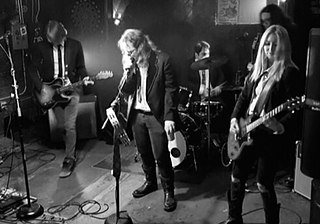
Garage rock is a raw and energetic style of rock and roll that flourished in the mid-1960s, most notably in the United States and Canada, and has experienced a series of subsequent revivals. The style is characterized by basic chord structures played on electric guitars and other instruments, sometimes distorted through a fuzzbox, as well as often unsophisticated and occasionally aggressive lyrics and delivery. Its name derives from the perception that groups were often made up of young amateurs who rehearsed in the family garage, although many were professional.
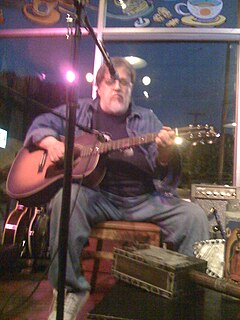
James Luther Dickinson was an American record producer, pianist, and singer who fronted, among others, the band Mud Boy and the Neutrons, based in Memphis, Tennessee.
The Lollipop Shoppe was an American garage rock band formed in Las Vegas, Nevada, in 1966.

Jackie Brenston was an American R&B singer and saxophonist, who recorded, with Ike Turner's band, the first version of the pioneering rock-and-roll song "Rocket 88".
The Mystic Tide were an American rock band who have been credited for creating some of the first psychedelic anthems. Despite their lack of commercial success, they are now highly regarded amongst followers of garage rock and are recognized for their innovative musical approach.

Teenage Shutdown! is a series of garage rock compilation albums assembled by Tim Warren of Crypt Records, best known for his Back from the Grave series. Most of the volumes in the Teenage Shutdown! series, gravitate towards the more raw and aggressive examples of the genre, but some volumes also reflect different aspects of garage rock, such as frat rock, soul-influenced rock, as well as folk rock and psychedelic. The series currently consists of fifteen LP's and CD's, which unlike the Back from the Grave series, are identical in both formats. The first ten installments were released in 1998 and the remainder in 1999 and 2000. The first volume Jump, Jive and Harmonize, was culled from the collection of 45-rpm singles owned by Mike Markesich. The series tends to follow the packaging format employed by other garage compilation series such as Pebbles and Back from the Grave: each volume includes detailed liner notes, for this series written by Mike Markesich, which include basic information about each song and group, such as origin and recording date. The information that they present reflects thorough research, including information about the circumstances of the recordings and brief biographical sketches of the groups. The various albums in the series occasionally include photographs of groups not actually included on the track listings, sometimes even going as far as to have such bands pictured on the front sleeves. Currently, there are fifteen volumes in the series.

The Guilloteens were an American garage rock band formed in Memphis, Tennessee in 1964. Much of the band's musical stance was distinguished for incorporating their homegrown Memphis influences with a hard-edged sound. Among the group's singles, the Guilloteens are most-known for their regional hit "I Don't Believe" and "Hey You". Although national success eluded the group, they are now considered one of the more accomplished garage rock acts to emerge from the era.
The Bees was an American garage rock and psychedelic band from Covina, California, that was active in the mid-1960s, and was best known for the 1966 paranoiac anthem "Voices Green and Purple". The song has been mentioned as an innovative example of early protopunk.
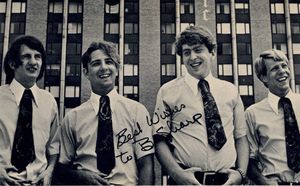
T.C. Atlantic was an American garage rock/psychedelic rock band from Minneapolis, Minnesota who were active in the 1960s. They were one of the most popular groups in the Twin Cities, but failed to break nationally. In the intervening years since their breakup, their recordings have attracted the interest of '60s music collectors and enthusiasts, and they are particularly remembered for their 1966 fuzz-tinged song, "Faces", which has been mentioned as one of the earliest garage rock songs to display psychedelic characteristics.

Sir Winston and the Commons were an American garage rock band formed in Indianapolis, Indiana, in 1963. The group released two highly regarded singles, which, upon release, earned the band a regional following, and resulted in reinterest in their music over the years. At the height of their popularity, Sir Winston and the Commons were regulars at the teen dance club the Cellar, in Chicago.
The Jesters were an American garage rock band from Memphis, Tennessee who were active between 1963-1964 and 1965-1967. They became one of the most popular groups in the Memphis area during the time. Led by Teddy Paige, they were unique amongst garage bands of the time in that they did not display any of the musical influences of the Beatles and the British Invasion, but reflected rather the a style of early rock and roll, rockabilly, and blues. Their work has attracted the interest of garage rock enthusiasts in recent years.
Joe Frank and the Knights were an American garage rock band from Leland, Mississippi who were active between 1959–1965. They were led by Joe Frank Carollo. In the early-to-mid 1960s their popularity grew beyond the Mississippi delta and Memphis areas as they became one of the most popular groups in various parts of the Southern United States. They had a regional hit with "Can't Find a Way", which attracted the attention of ABC Records who picked up the record and re-released it for national distribution. However, the band broke up shortly thereafter, and Carollo joined the T-Bones, who later evolved into the soft rock trio Hamilton, Joe Frank & Reynolds in the early 1970s.
The Breakers were an American garage rock band from Memphis, Tennessee who were active in the 1960s. They became one of the most popular bands in the Memphis area and enjoyed considerable success with their regional hit "Don't Bring Me No Flowers ". There has been a resurgence of interest in the Breakers amongst garage rock collectors and enthusiasts in recent years.

Public Nuisance was an American rock band from Sacramento, California who were active from 1964-1970, first as Moss & the Rocks, then later as Public Nuisance. In 1965 they recorded the song "There She Goes" as Moss & the Rocks for a single released on the local Icon label. After changing their name to Public Nuisance in 1967, they began to incorporate psychedelic elements into their sound and a series of mostly unreleased songs recorded at various sessions from 1968-1969 that went for years unissued, but finally saw the light of day in 2002 with the release of the Gotta Survive anthology. Since then, their work, both as Moss & the Rocks and Public Nuisance, has attracted the attention of garage rock and psychedelic enthusiasts worldwide.
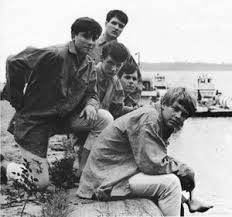
Lawson and Four More were an American garage rock/psychedelic rock band from Memphis, Tennessee, who were active in the 1960s. The group was led by Bobby Lawson and was known for their hard, blues-based sound which, as they evolved, increasingly incorporated esoteric psychedelic elements. The group regularly worked with musician, songwriter, and producer Jim Dickinson and cut the first rock release for Memphis label, Ardent Records. As a side-project, they briefly recorded under the name The Avengers, as a Batman-themed takeoff group in 1966.
Randy and the Radiants were an American garage rock band from Memphis, Tennessee who were active from 1962–1966 and then again 1976–1984. They were one of the most popular groups in the Memphis area during the 1960s. Through their association with Knox Phillips, son of Sam Phillips, they signed with Sun Records and recorded two singles on the label which became hits in the region. Their second release, "My Way of Thinking", became one of the top hits in the area, reaching #1 on WGMN's charts. The group's work has today become highly regarded amongst garage rock enthusiasts and collectors.
A History of Garage and Frat Bands in Memphis 1960-1975, Volume 1 is a garage rock multi-genre compilation available on compact disc consisting of songs by various artists, recorded in the 1960s, compiled by Ron Hall, who also wrote the book for which it is named. There earliest song on the set was recorded in 1961 and the latest in 1969—there are no songs from the 1970s, but the part of the title which reads "1960–1975" is meant to mirror the title of the book, which covers acts from the entire range of years. The fifteen songs on the collection represent the diversity of Memphis garage rock, stretching from its early 1960s rock & roll roots to frat rock, "pure" garage rock, Stax soul-influenced rock, and psychedelic. According to Heather Phares of Allmusic, the album's tracks "...trace the history of the Tennessee city's underground music scene, offering enough twists and surprises along the way to make the collection worthwhile for die-hard fans of frat and garage rock from the '60s..."
The Wilde Knights were an American garage rock band from Longview, Washington who active in the 1960s. They emerged from a group known as the Furys and later the Pipers VI, who recorded several frat rock records. After becoming the Wilde Knights, they wrote and recorded two songs in 1965 which were both released as singles that year and are now recognized as garage rock classics, "Beaver Patrol" and "Just Like Me", the latter of which later provided a huge hit for Paul Revere & the Raiders. In the late 1960s they evolved into Genesis, the King Biscuit Entertainers, and American Cheese, and issued records under those various names.

The Kings Ransom were an American garage rock band from Allentown, Pennsylvania who were active from 1965-1968 and were a popular act in the Lehigh Valley area, as well as around Philadelphia. Their record "Shame" became a hit in Milton, Pennsylvania and received airplay in Michigan. In the intervening years the Kings Ransom's music has come to the attention of garage rock enthusiasts with the release of several of their songs on compilations such as Allentown Anglophile and Teenage Shutdown! Teen Jangler Blowout!
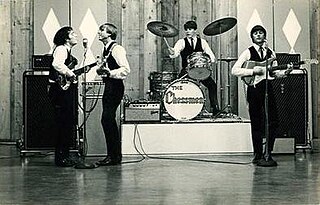
The Chessmen were an American garage rock band from Denton, Texas, near Dallas, who were active in the 1960s. They were one of the most popular bands in the region and recorded for Bismark Records, where they recorded three singles including, "I Need You There", which is now considered a garage rock classic. The band is notable for including several members who went on to greater fame. Jimmie Vaughan, brother of Stevie Ray Vaughan was briefly a member, joining after the death of original band leader, guitarist, and vocalist, Robert Patton, who died in a boating accident in 1966. Drummer Doyle Bramhall later played with and wrote songs for Stevie Ray Vaughan, and Bill Etheridge later played bass with ZZ Top. Following the breakup of the Chessmen, several of their members, including Jimmie Vaughan, went on to form a group that would come to be known as Texas Storm, which eventually included Stevie Ray Vaughan on bass.











